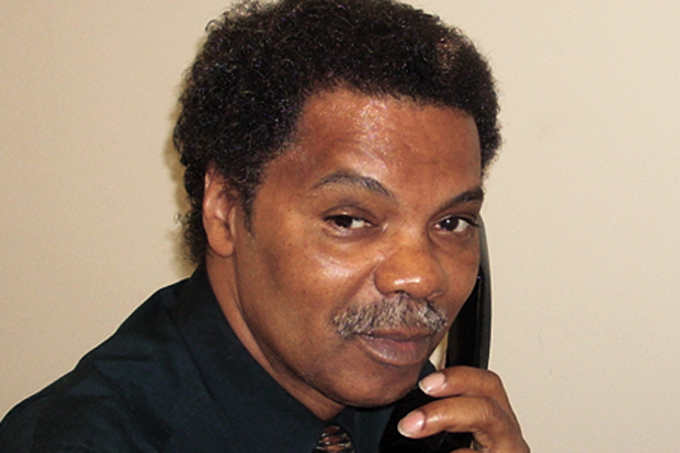
ULISH CARTER
In the new movie “42” about Jackie Robinson breaking the color barrier in Major League Baseball Wendell Smith is the fourth most important character in the movie behind Branch Rickey, (Harrison Ford), and Jackie and Rachel Robinson, (Chadwick Boseman and Nicole Beharie).
The movie opens with Smith, played by Andre Holland, telling the story.
Smith was sent by the Courier to cover Robinson’s effort to integrate Major League Baseball and becomes the Robinsons’ chauffer, finds places for them to stay and becomes their best friend while covering his year in the minor leagues as well as his first in the Majors.
Even though there has been to my knowledge two other movies made about Jackie Robinson, this is the first to include Smith who led the crusade to get Major League Baseball integrated. Well, it really wasn’t just Smith, it was the Courier led by Bill Nunn Sr.
After World War II ended the Double V campaign had to be revised by the Pittsburgh Courier, then the largest Black newspaper in the country. With victory overseas, and the military being integrated half the battle had been won, but the battle at home for equal rights was far from ended. Thus the Courier behind the leadership of Bill Nunn Sr., the managing editor, and a big time sports fan himself having been one of the greatest athletes to come out of Westinghouse, launched yet another battle, this one was to integrate major league sports. And since Major League Baseball was the biggest sport in this country at the time, this is what they targeted, with a weekly campaign by the entire sports staff as well as editorials demanding the Major Leagues accept Blacks into the league with the argument that Blacks were just as good as athletes and just as intelligent as Whites. This campaign was one of many the Courier launched to break down the walls of inequality and segregation. Leading the fight on the Sports front was Courier sports writer Smith and others on the staff. Also joining the fight was the Chicago Defender, which was the second largest Black paper of that time. But not only did they write in the papers they sent letters to all the owners and General Managers including Branch Rickey urging them to do the right thing, accept Blacks into the league, explaining to them how it would benefit their teams financially as well as in the win column. But it fell on deaf ears until Rickey finally decided to give it a shot in 1946.
The Courier sent Smith out to follow Robinson wherever he went. This was the story of the century, the biggest break through for Negroes since the Civil War if it happened. Smith stuck to Robinson like glue, and many don’t believe Robinson could have made it if not for Smith, who made sure the Robinsons’ were housed in every city he traveled including Montreal where he spent his first year in White professional ball.
Smith also became a trailblazer by becoming the first Negro to get a seat in the Major League Press Box. Before this event Blacks had to sit out in the stands with their typewriters.
Even though Rickey was the man who made the final decision to accept Blacks into the Majors, and Robinson was the player who accomplished this great feat, it was the Courier behind the leadership of Nunn Sr., with the backing of Publisher Jesse Vann, who initiated the whole campaign to keep pressure on the Majors, and make everyone aware of the great Black baseball players, and why they were just as good as the White players. And why the Negro should not and would not accept anything but equal opportunity.
Meet the Press had Rachel Robinson and movie historian Ken Burns, who is working on a biography of Jackie Robinson, on the program. Burns called Robinson one of the greatest heroes of history and I totally agree with him. And I also agree with him that Robinson’s accomplishment was the greatest achievement for Blacks since, he said the Civil War, but I say since the Emancipation Proclamation, because the Civil War really wasn’t fought to free the slaves. Rachel said she was very pleased and thrilled with the movie but wondered out loud what took Hollywood so long. I’m still wondering why Oprah Winfrey, Tyler Perry, Spike Lee or some of those rich Black baseball players didn’t put up the money for the movie years ago.
She said hopefully young people, Black and White, would go out to see it and be inspired to lead more productive lives.
I agree with her also on how disappointing it is that so many young people don’t know about Robinson, and what he did to open the doors for them? I’m talking about young athletes as well. Especially when I hear them thanking Michael Jordan. That is one of the reasons there’s still a long way to go when it comes to Blacks getting a total piece of the sports or corporate pie. Managers, coaches and management is still nowhere near what it should be and the number of Black American born players are rapidly dropping, despite the fact that baseball players are the highest paid players of any sport, and with the longest life expectancy which means they make more longer.
If you haven’t seen it go out and watch it. Take your kids. It doesn’t matter how old they are. It brought tears to my eyes, it made me mad, it made me happy, it made me laugh. What more could you ask from a movie.
I strongly feel it should be required of all Public Schools, and other students to watch this movie to know something of our history.
(Ulish Carter is the managing editor of the New Pittsburgh Courier.)